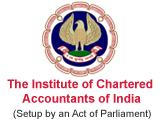The Institute of Chartered Accountants of India (ICAI) is a statutory body established by an Act of Parliament, viz. The Chartered Accountants Act, 1949 (Act No.XXXVIII of 1949) for regulating the profession of Chartered Accountancy in the country.

The Institute of Chartered Accountants of India (ICAI) is a statutory body established by an Act of Parliament, viz. The Chartered Accountants Act, 1949 (Act No.XXXVIII of 1949) for regulating the profession of Chartered Accountancy in the country.
The Institute, functions under the administrative control of the Ministry of Corporate Affairs, Government of India. The ICAI is the second largest professional body of Chartered Accountants in the world, with a strong tradition of service to the Indian economy in public interest.
The affairs of the ICAI are managed by a Council in accordance with the provisions of the Chartered Accountants Act, 1949 and the Chartered Accountants Regulations, 1988.
The Council constitutes of 40 members of whom 32 are elected by the Chartered Accountants and remaining 8 are nominated by the Central Government generally representing the Comptroller and Auditor General of India, Securities and Exchange Board of India, Ministry of Corporate Affairs, Ministry of Finance and other stakeholders.
ICAI is a statutory body established by an Act of Parliament, viz. The CA Act, 1949 for regulating the profession of Chartered Accountancy in India.
© 2025 coursetakers.com All Rights Reserved. Terms and Conditions of use | Privacy Policy